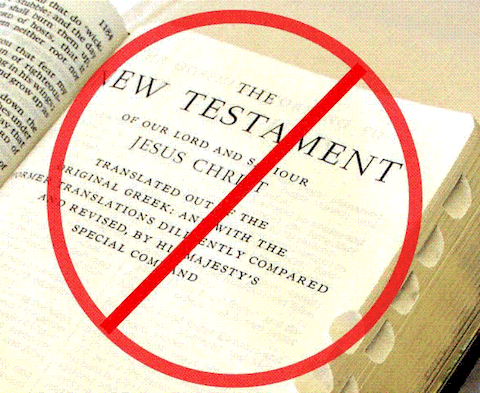
1001 Errors in the Christian Bible
Home
Dedication
Matthew
Mark
Luke
John
Acts
Contact Us
Matthew -- Errors 29-35
#29
Matthew 1: (KJV)
23 “Behold, a virgin shall be with child, and shall bring forth a son, and they shall call his name Emmanuel”
The phrase above, “they shall call”, in the Hebrew is in the
third person feminine form and should be translated, “she will call”.
It’s likely that “Matthew” intentionally changed the phrase
because in verse 21 Joseph was instructed to “call his name Jesus”.
#30
Matthew 1: (KJV)
23 “Behold, a virgin shall be with child, and shall bring forth
a son, and they shall call his name Emmanuel, which being interpreted
is, God with us.”
The phrase “call his name”, which Matthew has translated from
the Tanakh is a Semitic expression meaning to name. The phrase “call
his name” would be redundant in Greek or English as one would say
either, “call him” or “name him”. As the phrase in
Hebrew refers to an actual name and not a description of someone Matthew
has presented a false prophecy as no one ever called Jesus by the name
“Emmanuel”.
#31
Matthew 2: (KJV)
5 …”for thus it is written by the prophet, 6 And thou Bethlehem,
in the land of Juda,”
The Greek would translate literally as “And thou Bethlehem, land
of Juda.”. That would be like saying “And thou Chicago, land
of Midwest”. According to my third grade Greek teacher, Mrs. Soukoupoopalis,
that’s bad grammar in Greek, Chicago or anywhere else. Codex Bezae
and the Old Latin changed the phrase to “Bethlehem of the land of
Judea”.
#32
Matthew 2: (KJV)
5 …”for thus it is written by the prophet, 6 And thou Bethlehem,
in the land of Juda,”
In addition to bad grammar in the Greek virtually all translations of
the Micah verse that “Matthew” is referring to say “Bethlehem
Ephratah” such as KJV:
Micah 5:2 “But thou, Bethlehem Ephratah”
So Matthew has chopped off “Ephratah” from the words of the
Prophet.
#33
Matthew 2: (KJV)
6…”art not the least among the princes of Juda”
Instead of “art not the least” the Masoretic text says “small
to be”. Even the Christian Greek translations of Micah generally
say, “are too small to be”. “Matthew” has changed
the quote in the Tanakh to avoid any description of Bethlehem as insignificant.
#34
Matthew 2: (KJV)
6…”art not the least among the princes of Juda”
Instead of “princes” the Masoretic text says “clans”
(literally, “thousands”). Christian Greek translations of Micah
generally say “thousands”. The consonants of the Hebrew word
(lpy) can mean “clans” or “rulers” so Matthew could
have chosen to ignore the Hebrew tradition of “clans” even though
it was accepted by the early Christians. In any case, using “princes”
creates an error in Matthew’s sentence structure because after deleting
“Ephratah” in the first part of the sentence he is then referring
to a city, Bethlehem, and not a clan, Bethlehem-Ephratah, so saying a
city “is not least among princes of Juda” makes no sense.
#35
Matthew 2: (KJV)
6… “for out of thee shall come a Governor, that shall rule
my people Israel.”
The Masoretic text and Christian Greek translations of Micah say, “for
out of thee shall come forth for me a ruler”. “Matthew”
has omitted “for me”, apparently so as not to give the appearance
that Jesus is ruling on behalf of anyone else. Notice that KJV (also NKJV)
has capitalized “governor” even though the original Hebrew of
Micah gives no indication that this ruler would be divine. I’m not
calling this an error because KJV is the only major translation which
capitalizes “governor” (or “ruler”).
Where's Yeshua?
See how many references you can find indicating that Yeshua was
the Jewish Messiah in the puzzle below made up of actual letters
taken from the Tanakh.
A--B--I--B--U--R--I--E--D--Y--E--S--H--U--A
B--E--S--O--N--I--F--N--O--E--L--H--I--N--S
N--E--T--A--I--A--I--V--E--S--M--O--S--B--I
O--S--H--R--N--L--I--E--S--M--S--N--T--A--I
W--H--E--N--C--U--B--S--W--I--N--W--S--A--N
A--I--P--W--O--F--E--L--B--A--L--K--P--S--I
Y--C--H--A--O--C--I--I--A--V--M--O--I--E--W
H--O--A--E--L--Z--O--M--I--I--D--W--Q--L--P
O--O--Y--U--K--F--G--E--L--I--U--E--A--I--W
S--N--O--W--B--A--L--L--I--N--H--E--L--L--I
E--S--T--W--G--S--K--Q--P--L--F--I--X--K--R
A--B--M--E--U--I--L--O--W--I--S--X--I--P--A